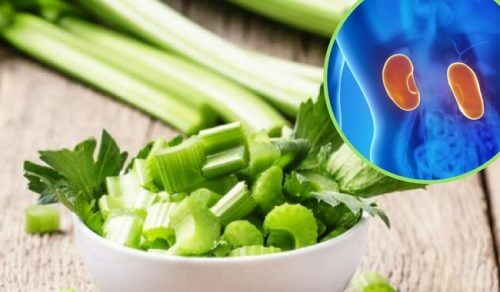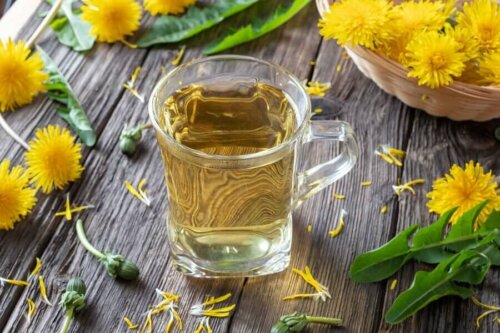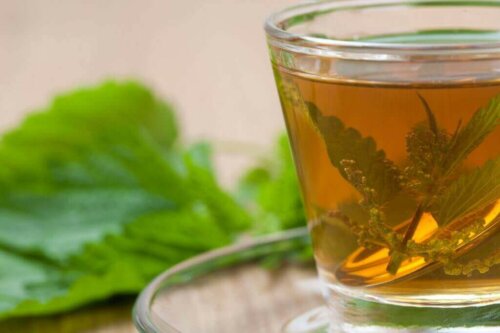Five Herbal Remedies to Fight Kidney Pain

When it comes to fighting kidney pain, it’s important to determine the origin of this symptom. Although several therapeutic options can provide relief, it’s essential to establish what’s causing it to choose an appropriate treatment.
Information published in American Kidney Fund states that pain in the sides or center of the upper back can come from the kidneys. However, this isn’t always a sign of a serious problem. Therefore, if you suffer from this symptom, it’s essential to see your doctor.
The professional, depending on the symptoms, may suggest a urine test and complementary tests such as an ultrasound or a CT scan. Based on the results, they’ll establish a more precise diagnosis and proceed to prescribe a treatment.
That said, there’s series of herbal remedies that can contribute to kidney health and help relieve localized pain in this area. However, they aren’t a first-line treatment and should be used with caution.
Although they’re natural alternatives, they can cause side effects and are contraindicated in some cases. In addition, the evidence on their safety and efficacy remains limited. Thus, they may be ineffective in some cases.
Possible causes of kidney pain
The kidneys are vital organs located in the lower back. Their main function is to filter the blood to remove waste through urine. Thus, they prevent the appearance of stones, as well as fluid retention and other problems.
Another function is to measure and maintain the balance of chemical compounds in the blood, such as potassium, phosphorus, and sodium. When there’s pain in the kidneys, it means that something’s altering their natural activity. According to Mayo Clinic, the possible causes are:
- Injuries
- Kidney stones
- Kidney infection (pyelonephritis)
- Polycystic kidney disease
- Kidney cancer or a kidney tumor
- Bleeding in the kidney (hemorrhage)
- Kidney cysts (enlargement or rupture)
- Blood clots in the kidney veins (renal vein thrombosis)
- Hydronephrosis (swelling of the kidneys due to urine accumulation)
It’s important to mention that kidney pain caused by kidney stones often occurs only when the stones begin to come out of the kidney. In addition, the aforementioned diseases don’t always cause kidney pain. Likewise, the pain may occur due to problems not related to the kidneys.
This article may interest you: 6 Basic Care Tips to Protect Your Kidneys
How to fight kidney pain?
Due to the serious causes behind kidney pain, it’s essential to go see a doctor or a nephrologist. These professionals are the only ones who can give an appropriate diagnosis. In addition, they’ll prescribe the appropriate treatment. And what about herbal remedies?

People have used some medicinal plants as adjuvants to fight kidney pain. However, as a publication in the Journal of Nephropharmacology points out, the safety of these types of remedies isn’t well established. In some cases – such as kidney failure – they can even be counterproductive.
Therefore, before using any herbal supplement, be it in its natural form, tablets, or any commercial presentation, it’s best to consult your doctor. If the pain is somewhat mild, you may be able to use these remedies without problems. If not, your doctor will probably advise against their use. What are the options?
1. Basil
To date, the studies linking basil to kidney problems are quite limited. A study published in the Ancient Science of life-Journal states that, in traditional medicine, the plant has been used to stimulate kidney function.
Specifically, this study concluded that basil has bactericidal effects thanks to its methyl eugenol/methyl chavicol content. Therefore, it could have positive effects against some infections. In any case, this is still being studied.
- You can include basil in your diet as a condiment or in tea. You should consume it in moderation, only in cases that don’t represent danger.
2. Dandelion tea

In popular culture, dandelion has been used as a natural urine stimulant. According to research published in the Journal of Alternative and Complementary Medicine, this plant has diuretic properties. Therefore, it could help in cases of fluid retention and kidney stones.
But beware! Despite the benefits we explained above, this remedy is contraindicated in cases of kidney failure, dialysis treatment, or kidney transplant. Evidence shows that dandelion is harmful in these cases.
Therefore, before trying it, you must have a diagnosis of the cause of your kidney pain. Based on this, you’ll be able to determine whether you can drink it or not.
3. Celery
Due to its diuretic properties, celery has been recommended to promote kidney health in cases of stones or problems associated with fluid retention. In addition, as research published in Evidence-Based Complementary and Alternative Medicine states, it’s a food rich in antioxidants and phenolic compounds that promote health.
However, like dandelion, it should be avoided in kidney disease, as it can be irritating due to its potassium content. If you don’t suffer from this problem, it’s safe to consume in moderate quantities. Include it in salads or infusions.
4. Nettle

According to a publication in Kidney School, nettle has been used as a diuretic and a treatment for kidney stones and prostate problems. However, there’s limited evidence of this effect. Despite this, in most cases, it’s safe to consume in moderate amounts.
However, as with other herbal remedies, you should avoid it in severe kidney disease, dialysis treatment, or fluid retention due to congestive heart failure.
5. Parsley
An article in the National Kidney Foundation (NKF) highlights parsley as “one of the best plants to cleanse the kidneys.” Due to its anti-inflammatory, diuretic, and antioxidant properties, it could be useful in promoting good kidney function.
In fact, research published in the International Journal of Molecular Sciences highlights that the plant and its extracts could be a complement for various kidney diseases. Particularly, it has positive effects on kidney stones.
According to evidence, the high chlorophyll and magnesium content in parsley produces an inhibitory effect on the dehydration of calcium oxalate and hyperoxaluria, respectively. In addition, it regulates urinary pH, which facilitates the elimination of kidney stones.
Of course, as in the previous cases, you should consume it moderately, preferably supervised by a doctor. The professional, according to the cause of the kidney pain, will determine if it’s safe to use.
Follow your nephrologist’s instructions
When it comes to fighting kidney pain, it’s essential to seek professional attention. Your doctor or nephrologist will suggest some tests to get a diagnosis. From this, they’ll prescribe the proper treatment.
Although herbal remedies may be helpful in some cases, they lack scientific support and aren’t considered a first-line treatment. Therefore, they should only be used in mild cases, when the professional considers them harmless or safe. If you have conditions such as kidney failure or dialysis, it’s best to avoid them.
All cited sources were thoroughly reviewed by our team to ensure their quality, reliability, currency, and validity. The bibliography of this article was considered reliable and of academic or scientific accuracy.
- Afifah, A., Muflikhah, K., Ati, V.R., Tsani, R.M., Khasanah, D., & Maulana, W. (2019). Protective Effect of Ethanol Extract of Celery (Apium graveolens L) on Kidney Damage in Ischemia/ Reperfusion Injury Rats Model. Molekul, 14(1). https://ojs.jmolekul.com/ojs/index.php/jm/article/view/448
- Asgari, A. (2014). Herbal medicines and kidney; friends or foes? Journal of Nephropharmacology, 3(1), 5-6. https://www.ncbi.nlm.nih.gov/pmc/articles/PMC5297591/
- Babaeenezhad, E., Ahmadvand, H., Kkorramabadi, R. M., Bagheri, S., Khosravi, P., & Jamor, P. (2019). Protective effects of olive in renal failure; a review on current knowledge. Journal of Nephropathology, 8(1). https://doaj.org/article/80ab48d477614e8c8f2795d6bc045777
- Bao, H. & Peng, A. (2016). The Green Tea Polyphenol(—)-epigallocatechin-3-gallate and its beneficial roles in chronic kidney disease. Journal of Translational Internal Medicine, 4(3), 99-103. https://www.degruyter.com/document/doi/10.1515/jtim-2016-0031/html
- Boeing, T., Tafarelo Moreno, K. G., Gasparotto Junior, A., Mota da Silva, L., & de Souza, P. (2021). Phytochemistry and Pharmacology of the Genus Equisetum (Equisetaceae): A Narrative Review of the Species with Therapeutic Potential for Kidney Diseases. Evidence-based Complementary & Alternative Medicine. https://onlinelibrary.wiley.com/doi/full/10.1155/2021/6658434
- Da-Costa-Rocha, I., Bonnlaender, B., Sievers, H., Pischel, I., & Heinrich, M. (2014). Hibiscus sabdariffa L. – a phytochemical and pharmacological review. Food Chemistry, 165, 424-443. https://www.sciencedirect.com/science/article/pii/S030881461400692X
- Kafeshani, M. (2015). Ginger, micro-inflammation and kidney disease. Journal of Renal Endocrinology, 1(1), 703-707. https://jrenendo.com/Article/jre_04
- Karaali, H. F., Fahmi, R. R., & Borjac, J. M. (2018). Effect of Ocimum basilicum leaves extract on acetaminophen-induced nephrotoxicity in BALB/c mice. Journal of Complementary and Integrative Medicine, 16(2). https://www.degruyter.com/document/doi/10.1515/jcim-2018-0111/html
- Keleş, R., Şen, A., Ertaş, B., Kayali, D., Eker, P., Şener, T. E., Dogan, A., Çetinel, Ş., & Şener, G. Ö. K. S. E. L. (2020). The effects of Urtica dioica L. ethanolic extract against urinary calculi in rats. Journal of Research in Pharmacy, 24(2), 205-217. https://www.jrespharm.com/abstract.php?id=779
- Mayo Clinic. (11 de abril de 2023). Symptoms. Kidney pain. https://www.mayoclinic.org/symptoms/kidney-pain/basics/causes/sym-20050902
- Nassan, M. A., Soliman, M. M., Aldhahrani, A., Althobaiti, F., & Alkhedaide, A. Q. (2021). Ameliorative impacts of Glycyrrhiza glabra root extract against nephrotoxicity induced by gentamicin in mice. Food Science & Nutrition, 9(7), 3405-3413. https://onlinelibrary.wiley.com/doi/full/10.1002/fsn3.2183
- National Institute of Diabetes and Digestive and Kidney Diseases. (Junio de 2018). Your Kidneys & How They Work. NIDDK. https://www.niddk.nih.gov/health-information/kidney-disease/kidneys-how-they-work
- Nirumand, M. C., Hajialyani, M., Rahimi, R., Farzaei, M. H., Zingue, S., Nabavi, S. M., & Bishayee, A. Dietary Plants for the Prevention and Management of Kidney Stones: Preclinical and Clinical Evidence and Molecular Mechanisms. International Journal of Molecular Sciences, 19(3), 765. https://www.ncbi.nlm.nih.gov/pmc/articles/PMC5877626/
- Ruggenenti, P., Caruso, M. R., Cortinovis, M., Perna, A., Peracchi, T., Giuliano, G. A., Rota, S., Brambilla, P., Invernici, G., Villa, D., Diadei, O., Trillini, M., Natali, G., & Remuzzi, G. (2022). Fresh lemon juice supplementation for the prevention of recurrent stones in calcium oxalate nephrolithiasis: a pragmatic, prospective, randomised, open, blinded endpoint (PROBE) trial. EClinicalMedicine, 43, 101227. https://www.thelancet.com/journals/eclinm/article/PIIS2589-5370(21)00508-3/fulltext
- Tasian, G. E., Ross, M., Song, L., Audrain-McGovern, J., Wiebe, D., Warner, S. G., Henderson, B., Patel, A., & Furth, S. L. (2019). Ecological Momentary Assessment of Factors Associated with Water Intake among Adolescents with Kidney Stone Disease. Journal of Urology, 201(3), 606-614. https://www.auajournals.org/doi/abs/10.1016/j.juro.2018.07.064
- Wilkinson, T. J., Shur, N. F., & Smith, A. C. (2016). “Exercise as medicine” in chronic kidney disease. Scandinavian Journal of Medicine & Science Sports, 26(8), 985-988. https://onlinelibrary.wiley.com/doi/abs/10.1111/sms.12714
- Yousefi Ghale-Salimi, M., Eidi, M., Ghaemi, N., & Khavari-Nejad ,R. A. (2018). Inhibitory effects of taraxasterol and aqueous extract of Taraxacum officinale on calcium oxalate crystallization: in vitro study. Renal Failure, 40(1), 298-305. https://www.tandfonline.com/doi/full/10.1080/0886022X.2018.1455595
- Zhu, W., Liu, Y., Lan, Y., Li, X., Luo, L., Duan, X., Lei, M., Liu, G., Yang, Z., Mai, X., Sun, Y., Wang, L., Lu, S., Ou, L., Wu, W., Mai, Z., Zhong, D., Cai, C., Zhao, Z., Zhong, W., Liu, Y., Sun, Y., & Zeng, G. (2019). Dietary vinegar prevents kidney stone recurrence via epigenetic regulations. EBioMedicine, 45, 231-250. https://www.thelancet.com/article/S2352-3964(19)30379-2/fulltext
This text is provided for informational purposes only and does not replace consultation with a professional. If in doubt, consult your specialist.








